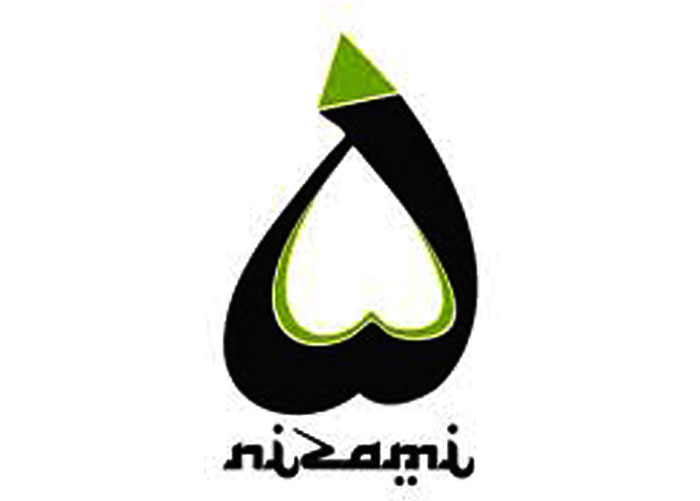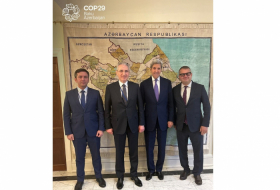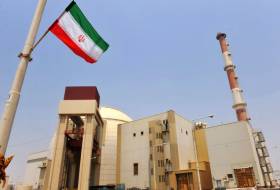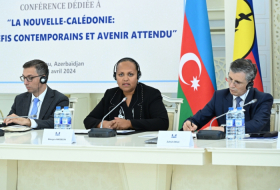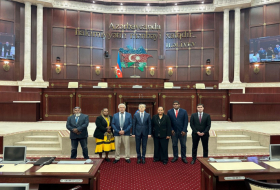The South Caucausus region gave to the world the most outstanding and finest creator of romantic epics, the great poet and philosopher Nizami Ganjavi (1141- 1209) who lived his entire life in Ganja, Azerbaijan. An unrivalled master of thoughts and words, a poet whose freshness and vigor has been acknowledged by all the succeeding biographers including Awfi, Qazwini, Dawlatshah and Lutf Ali Beg and poets like S‘adi, Hafiz, Jami and Ismat.
In recognition of his vast knowledge and brilliant mind, the title of Hakim also was bestowed upon him by scholars. From his poetry it is evident that he was learned not only in mathematics, astronomy, medicine, jurisprudence, history and philosophy but also in music and the arts.
His poems stand out with fascinating description of love and humanist thoughts about a human’s destiny that plumbs the human psyche with an unprecedented depth and understanding. To be sure, a profound spiritual and social consciousness pervades his poetry, and to suggest otherwise would be to do him a disservice.
Nizami was a person who had read a lot. He did not focus only on Turkic, Persian and Arab sources. He was fully acquainted with various Christian and Jewish sources too. His knowledge of several languages gave him the ability to read numerous books, and got familiarized himself with sources in other languages as well. Such diverse knowledge about things gave him an opportunity to create a literary world that covered the entire cultural gamut of his times.
Nizami’s poetry is comprised of lustrous artistic expressions of the most humane, socio-political and ethical ideals of his time. Bruijn states that Nizami stresses on “the ideal way of life drawing attention of his reader to the supreme rank of men among the creatures of the world and the necessity to become aware of his eternal destination.” The concept of harmony, brotherhood, social justice, womens’ rights, religious tolerance, equality and fair play in statecraft and the description of man’s spiritual existence forms the main subject of Nizami’s literary discourse. His poems greatly nurtured the theme of love and harmony that has since been followed widely in world literature. Nizami brought the highest humane ideals and new professional achievements into the literature of the Eastern nations and ushered in a new era in development of literary theory. He always aspired to link literature with the real life. In this manner, his poetry always reflected the preservation of human values and dignity. Being one of the remarkable poet-philosopher of his age, Nizami was the first to describe a woman as possessing high human qualities. He convincingly advocates the participation of women in all spheres of life along with men. In the eastern literature, he was the first to write about women in such freshening attitude.
One of the main reasons behind the splendid poetry of Nizami is that he wrote his poems in the name of humanity, respect and love for humanity. Nizami says:
Kasi dar band-e mardom chun nabashad Ki u az sang mardom mitarashad “How can a person who creates a human (monument) from stone not love and admire the human beings”
Be mardom dar amiz agar mardomi
Ke ba adami khugarast adami
“If you are human, mix with humans, only then your humanity will be proved”
This idea (the principle of humanism) forms the basic constituent of Nizami’s philosophy. Nizami carried this idea from his first rhyme and continued it to the last poem. In his Haft Paykar Nizami addresses man:
You are the angel, who defends God’s praise;
knows the Creator’s signs. Contemplate goodness;
be not bad observe the beast;
be not a beast.
Both good and evil you can weigh aspire to Reason’s sovereignty.
Nizami desires man to be pious and thoughtful of his Creator’s bounties. The man is the focal point of his poetry. J.Christoph Bürgel, regarding Nizami’s perception of man states:
“...His image of man is neither flat nor idealized. In general, his image is dynamic and full of endeavour, displaying a thorough knowledge of man’s psyche. His heroes are not static types; they are human beings, who undergo a development, driven by their particular dispositions and emotions. They have to struggle against temptations that come from within, they have to purify themselves in order to become what the poet (here as it were in the place of God) wants them to become...”
At the same time Nizami also acknowledges that human beings have always faced problems which have influenced them and their lives in several respects. Nizami is convinced that the miseries, paradoxes and crises in human society occur as a result of Man’s deviation from the right path. This deviation results in family problems, racial inequality, imbalanced ethical relationships, poverty, problems of mental and physical health, rage, struggles, social aggressions, and so on. These issues are particularly adressed in Nizami’s poem Makhzan e-Asrar.
Relevance of Nizami in the Contemporary world Scenario:
Nizami’s philosophy and teachings address both the state of affairs in society and polity as well as statecraft and governance. The crises in the past, similar to the present ones, were a threat to the lives and security of humans and caused despair, anxiety, and bewilderment. He identifies four important areas which necessitate immediate attention: 1. Human life 2. Ethical and emotional crises
3. Crisis in the realm of peace, security and spirituality.
Human life: One of the most crucial issues in human situation is that of life and death, existence and nonexistence. It includes concepts such as bafflement, meaninglessness, negligence, and self-alienation. It engenders a feeling of alienation that becomes visible through lawlessness, powerlessness, social exclusion and self-estrangement. Human beings with such challenges and handicaps are incapable of getting involved with their dominant social organizations, and will ultimately suffer identity crisis and exclusion. This seems to be a major problem and philosophers, sociologists, and psychologists have attempted to explore and analyze it. Nizami advises people to respect and appreciate the resources of the Universe instead of damaging and destroying them that results, according to Nizami, in the unbalancing of whole Creation Plan and World Order. To do so Nizami invokes the guidance from wisdom and knowledge. At the same time, he advocates that we must ignore the mundane world and try not to become fixated on it. Thus humans can overcome horrible situations, combat the threats to human existence and re-instate a just and balanced world order by using their knowledge, wisdom, and intellect. Nizami maintained that individuals should avoid ignorance by developing their reasoning to its maximum through education and keeping the company of scholars and intellectuals. “Human life is short and there is no room for superfluous and flippant wastage of time and resources bestowed by Nature to us. God has created the universe for a specific time and definite purpose of testing human behavior. Knowledge and wisdom, thus, can lead people to handle and overcome their crises at minimal risk.” Emotional and Ethical crisis: according to the Nizamian philosophy the crisis in the realm of morality and emotions stems from ethical disagreements and psychotic disequilibrium. In order to overcome such a crisis, Nizami stresses on shunning egoism and selfishness, lust, sensuality and pride. Accordingly, Nizami’s poetry can be used in a practical manner to address the crisis in the realm of mental and emotional abnormalities. One of the central concepts of Nizami’s philosophy is identifying one’s weaknesses and strengths, psychological and spiritual needs and demands and by obtaining certain skills one can avert such crisis. Nizami, therefore focuses on attaining certain important skills such as self-awareness, empathy, interpersonal relationships, effective communication, stress management, management of emotions, problem-solving, decision-making, creative and critical thinking. These skills will ultimately lead to management of crisis. As such, Nizami contended that there are inherent capacities and capabilities present in human beings through which one can achieve happiness and realize a sense of purposefulness in this universe. To achieve this, he emphasizes that human beings should utilize the universe and life, not destroy and waste the same. He states:
He (God) created laughter so that it can lessen one’s pains;
and created Venus to be the delight in the night. Live happily for these few days of life and be calm. Similarly, Nizami reiterates that one can address emotional and mental frustration by seeking assistance from God. In this manner, confession can also help in boosting ones fortune:
Is there anyone who appeals to You (God) more than we do? Is there anyone who is more rueful and repentant than we are? Look at His Goodness and Beneficence and try to imitate; confess to your faults. According to Nizami, people should approach things with moderation. He says that haste and hate should be avoided as much as possible and asserts that if you wish to see happiness, be respectful towards people. Hiding others’ weaknesses and admitting one’s mistakes is considered as a virtuous act. The main causes of psychological crisis that impedes development, according to Nizami, are egoism and narcissism. In the following lines, he describes these weaknesses:
The wind is floating but you are heavier than a mountain (which is why you cannot move). The world has become a mirror reflecting your narcissism and you see yourself wherever you look. You are nothing but an egotist that only beholds his/her own beauty Try to come to know yourself better in the world. Recognize your potentials and you will become eternal. Crisis in the realm of Peace, Security and Spirituality:
One of the defining differences between pre-modern and modern literary works is in the ethical relation of the individual and society. In modern works, to simplify a great deal, society is corrupt and the hero must redeem it, or at least maintain his integrity against it. In pre-modern works, society
represents the ethical norm, and the individual must either be brought into conformity with it or expelled from it. Historically, peace, law and order, individual security and calm have been among the most essential human desires and people always struggled to attain them. However, in contemporary times, peace and security are seen at risk in a sense that social problems have exacerbated; issues such as moral deviance, social fragmentation which in turn have impacted social security in a variety of different ways. In this context, in order to lessen the crisis by bringing the human being to a state of balance and relative security, Nizami considers application of certain important principles. Therefore, he advises people to establish peace and security by avoiding injustice and violation. Nizami primarily considers mercy, kindness, and not harming others as important factors for the creation of peace and stability in the society. In his view, therefore, injustice is one of the major causes of conflict and insecurity. For Nizami, this crisis can be diffused through resisting injustice and acknowledging mercy and kindness as important and inalienable virtues. According to Nizami, “ injustice can lead to the toppling of governments and their authority. This, in turn, will cause bloodshed and violence in the society. Violence will compound the violence. Ultimately peace will be nowhere, injustice will be everywhere.” In our opinion if the Nizamian philosophy of justice and fairplay would be applied and adhered to by the cotemporary rulers in the world, there would be no bloodshed and misery; the globe would not have changed into a conflict zone. The race and competition in knowledge and technology would not have been replaced by the race of weapons and arms. The world would not be the abode of destitute and deprived people, it would have been rather a world of prospects and opportunities. Technology would not have been misused to destroy the natural resources of this universe; ecological imbalance and environmental disasters would not have been our fate and to crown it all our existence would not have been endangered as we are witnessing it now. Justice would have will brought peace and stability in the realm of smooth functioning of governments. Nizami says:
Wisdom comes with decency and art; justice and equity are the best forms of art. The pre-condition to ruling and politics is justice although injustice and tyranny dominate the world. Justice and fairness stabilize governments and it is justice that brings order to human affairs. It is better to give away what you have than to obtain something from mean hands (stingy people).
Nizami gives huge importance to philanthropy and kindness towards people. He advises people to care for others in a sense that they can be a cause of security and peace for others. In his poems he often stresses on praising God and winning hearts and minds of the people. Regarding justice, he says, “Try to provide the convenience of laborers and farmers; suffer yourself but do not make others suffer. Solve the problems of people to earn respect and eminence. Do not intend to disturb other’s comfort and peace; annoyance and nuisance will bring shame.” For Nizami, religion is one element of life that has sustained the people ethically, spiritually, economically, socially and politically. It has given meaning to hopeless lives. Religion as such has provided for a universal language and culture for those who believe in a higher spiritual power. According to Nizami, the loss of religion and not recognizing its authority can lead to lawlessness and conflict. In today’s age, the loss of spiritual values has further aggravated the political and economic crisis. Human beings are surrounded by this crisis and are continuously grappling questions, methods and pretexts. Nizami maintains that such a crisis can be averted by making a determined attempt to accept and promote religious values and ethics. Everyone can live in accordance with his own desires. However, one must acknowledge and accept the religious and spiritual values. Religion leads the world towards justice and equality. The best thing for human beings is obedience to God and people must safeguard themselves from evil intentions and false temptations. Nizami says:-
Your primary duty is to be religious and promote religion as this is the way of just and fair people. If you are religious and religion supports you, you will achieve justice. Obey God and avoid sins so that you will not be rueful and apologetic like sinners. Life is short! Obedience to God is the best thing to do. Listen to the call of religion; resist your temptations. Thus from the above discussion it becomes clear to us that Nizami is one of the remarkable personalities who has provided valuable insights on addressing the issues related to the contemporary human condition. He skillfully demonstrates the different ways in approaching various dimensions of the human existence. As he peers, he attempts to offer solutions in a manner that the contemporary humans can
find them useful in tackling the issues related to society, polity, ethics and spirituality. Nizami says, in contemporary age, the crisis related to peace and spirituality can be settled through avoiding absolutism and unfairness. Regarding the spiritual crisis, Nizami argues that people can reach a balance by returning back to religion and spiritual values in order to obtain a just social order. Evidently, Nizami made a startling contribution by addressing issues related to the different aspects of human existence and as such his philosophy can be very useful in solving the numerous problems confronting the humanity in today’s age.
To conclude it would be appropriate to say that the contemporary world that is swamped by stark, naked materialism that is demonstrated particularly in the handling of Covid-19 pandemic and a world- torn apart by terror and intolerance, must again strive for the 800 years old soul stirring wine of love and ethics— the message of the Nizami - the message of love, spirituality and ethics that needs to be re-emphasized and re-iterated to inspire a world that is shattered by great cultural polarizations, ideological disagreements, hatred, intolerance, unwanted, unwarranted and uncalled for interventions in the world affairs by the superpowers –thereby giving rise to conflicts instead of resolving the same. More so when the discourse of co-existence and harmonious relations among different faiths of the world is assuming enormous importance in the face of the perceived menace of racialism and the clash of civilizations and the rising tide of religious extremism in many parts of the globe.
Bibliography
1. Chelkowski,P.J(1995), “Nizami Ganjavi,”Encyclopedia of Islam.
www.Diplomaticstar.net/nizami-ganjavi-great-azarbaijani- poet-and philosopher.html( accessed on 7-3-2015) 2. www.irs-az.com/.../1331277670434996769.pdf 3. Meisami , The Haft Peykar. A Medieval Persian Romance, tr. J.S.
Meisami, Oxford,1995. 4. Johan Cristoph Burgel and Christine Van Ruymbeke, eds. (2011), A
Key to the Treasure of Hakim: Artistic and Humanistic Aspects of Nizami Ganjavi’s Khamsa. 5. Enayat, H., 1970. Self-Alienated World, Tehran,1970. 6. Nezami, 2005. Collected works. (Dastgerdi, Vahid (Compiler).
Tehran: Mahtab. 7. Cf. Tar, Z., 1977. The Frankfurt School: The Critical Theories of Max
Horkheimer and Theodore W. Adorno. A Wiley-Interscience Publication. New York: John Wiley & Sons. 8. Alireza Nabiloo and Hosseinali Ghobadi, International Journal of
Asian Social Science, 2014. 9. Nezami, 2005. Collected works. 10. Hamilton, P., 1998. Sociology of Religion. Trans. Salasi, Mohsen.
Tehran: Tebian Publication.
More about: Azerbaijan Nizami-Ganjavi








